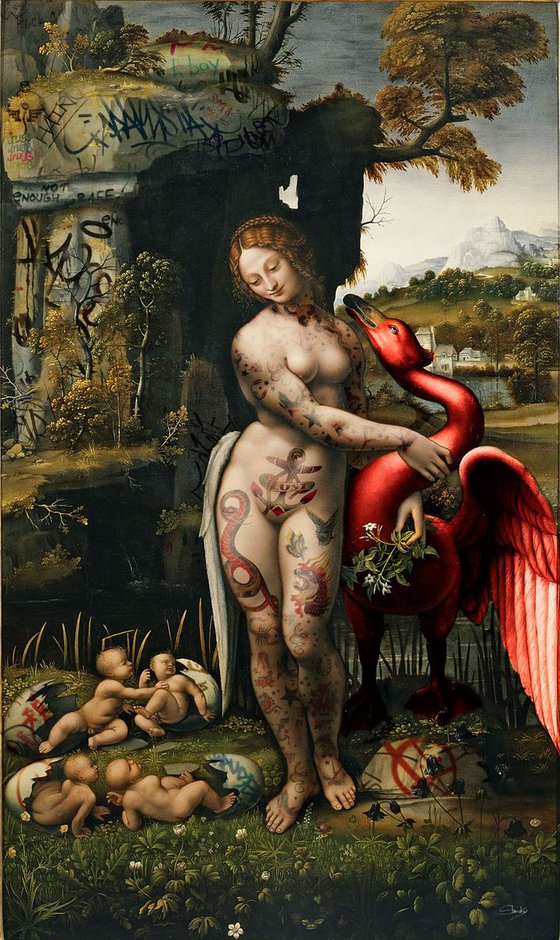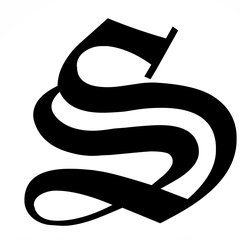- By medium
- By subject
- By budget
- Sales
- Gift cards
- Discover all art
- Artists
- Editors’ picks
- Ideas
Artwork description:
Legend has it that Zeus, who fell in love with Leda, turned into a swan to mate with her on the banks of the Eurota river and that on the same night she then also lay with her husband Tindaro.
After these unions, the Dioscuri (Castor and Pollux), Elena and Clitennestra were born from the eggs.
The mythical tradition, however, is discordant about which was the divine progeny and despite some claim that all the creatures came out of the egg were daughters of Zeus (sometimes they mention only the names of Castor and Pollux), according to some versions the immortal sons of Zeus it would not be the Dioscuri, but only Polluce and Elena, while the other two (Castor and Clitennestra) would be sons of the mortal Tindaro.
Toilet mirror of Boscoreale treasure. Paris, Louvre Museum.
According to another version of the myth, Zeus, in the form of a swan chased by an eagle, took refuge in Nemesis's lap and after the embrace Nemesis deposed an egg that Hermes placed between Leda's thighs while sitting on one stool with legs apart. In due course the woman gave birth to Elena and Zeus immortalized the image of the Swan and Eagle in the sky in memory of his adventure, while Leda was deified later as the goddess Nemesis.
It is suspected that Leda was the goddess Latona or Leto or Lat, who generated Apollo and Artemis in Delos. The myth of the hyacinth egg recalls that of the Easter red egg called glain that the Druids sought each year on the seashore; for this Celtic myth this egg was emitted by the goddess in her metamorphosis into a sea serpent. The legend of Leda with the egg placed between the thighs may have come from a representation of the goddess crouched on a stool from the parturient who was about to give birth to Apollo with the head of the god coming out of her womb.
Materials used:
canvas, ink pigments resin
Tags:
#landscape #flowers #red #sky #street art #graffiti #swan #slasky #renaissance #neourbanclassic® #tattoos #zeus #leda and the swanLeda and the Swan (2018) Digital Art (Giclée)
by Slasky
132 Artist Reviews
£641.78 Sold
- Digital Art (Giclée) on Canvas
- From a limited edition of 1
- Size: 52 x 88 x 0.1cm (unframed) / 52 x 88cm (actual image size)
- Signed and numbered certificate of authenticity
- Style: Urban and Pop
- Subject: People and portraits
Do you like this artwork?
This artwork has sold, but the artist is accepting commission requests. Commissioning an artwork is easy and you get a perfectly personalised piece.
Loading
Artwork description
Legend has it that Zeus, who fell in love with Leda, turned into a swan to mate with her on the banks of the Eurota river and that on the same night she then also lay with her husband Tindaro.
After these unions, the Dioscuri (Castor and Pollux), Elena and Clitennestra were born from the eggs.
The mythical tradition, however, is discordant about which was the divine progeny and despite some claim that all the creatures came out of the egg were daughters of Zeus (sometimes they mention only the names of Castor and Pollux), according to some versions the immortal sons of Zeus it would not be the Dioscuri, but only Polluce and Elena, while the other two (Castor and Clitennestra) would be sons of the mortal Tindaro.
Toilet mirror of Boscoreale treasure. Paris, Louvre Museum.
According to another version of the myth, Zeus, in the form of a swan chased by an eagle, took refuge in Nemesis's lap and after the embrace Nemesis deposed an egg that Hermes placed between Leda's thighs while sitting on one stool with legs apart. In due course the woman gave birth to Elena and Zeus immortalized the image of the Swan and Eagle in the sky in memory of his adventure, while Leda was deified later as the goddess Nemesis.
It is suspected that Leda was the goddess Latona or Leto or Lat, who generated Apollo and Artemis in Delos. The myth of the hyacinth egg recalls that of the Easter red egg called glain that the Druids sought each year on the seashore; for this Celtic myth this egg was emitted by the goddess in her metamorphosis into a sea serpent. The legend of Leda with the egg placed between the thighs may have come from a representation of the goddess crouched on a stool from the parturient who was about to give birth to Apollo with the head of the god coming out of her womb.
Materials used:
canvas, ink pigments resin
Tags:
#landscape #flowers #red #sky #street art #graffiti #swan #slasky #renaissance #neourbanclassic® #tattoos #zeus #leda and the swan14 day money back guaranteeLearn more


